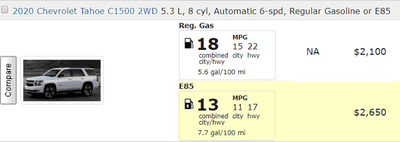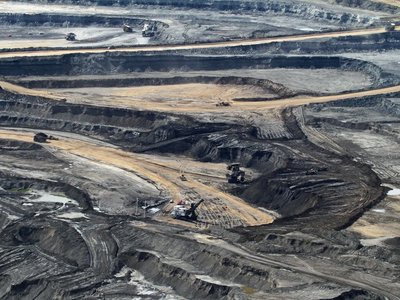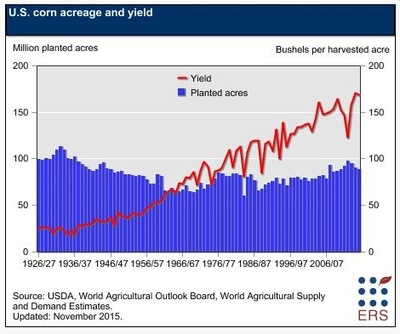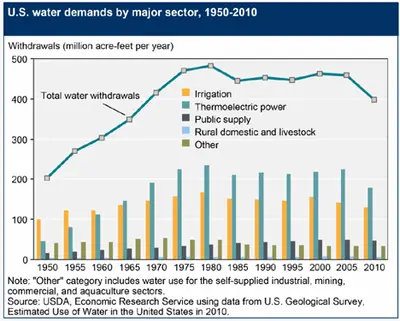A New Open Letter to Marlo Lewis, Jr., Senior Fluffer at Competitive Enterprise Institute and Lap Dog to Big Oil
 |
By Marc J. Rauch
Author of THE ETHANOL PAPERS
Exec. Vice President/Co-Publisher
THE AUTO CHANNEL
 Marc Rauch |
This past September, Marlo Lewis Jr. wrote an editorial attacking pollster Frank Luntz and ethanol fuel.
My 'open letter' rebuttal to that editorial was published in September, shortly after the publication of Lewis' editorial.
A couple of days ago, on Wednesday, December 18th, Lewis responded to my 'open letter' rebuttal of his anti-ethanol editorial.
• Marlo Lewis' September editorial attacking ethanol and Frank Luntz can be read by CLICKING HERE
• My 'open letter' reply to that September editorial can be read by CLICKING HERE
• Marlo Lewis' Dec. 18th response to my September reply to him can be read by CLICKING HERE
According to his website, Marlo Lewis, Jr. is a senior fellow at the Competitive Enterprise Institute (CEI), a group that has received funding from a range of energy industry groups and conservative foundations such as the Koch family foundations, ExxonMobil, Texaco, Arch Coal, and the American Petroleum Institute (API) among others. He also has very impressive academic credentials, a Ph.D. in Government from Harvard University and a B.A. in Political Science from Claremont McKenna College.
Me? I'm from Brooklyn, so I guess I have the edge, but I'll try not to abuse the advantage.
The following is a new 'open letter' rebuttal to Mr. Lewis. As with my earlier rebuttal, and long standing policy of informing people when I write about them, I am simultaneously alerting Mr. Lewis to this new open letter.
Hello again Marlo -
 Marlo Lewis |
I loved reading your reply because it proves my original contention that you know nothing of the subject matter, and it gives me so much to work with in this 2nd open letter to you. Given my enjoyment for textual sparing, and the season, it's like receiving a combination Christmas-Chanukah gift at the same time. With this in mind, let me set aside any difference we may have to wish you and your family a fantastic holiday and coming new year.
ON WITH THE SHOW
Perhaps the best example I can provide of your ignorance of the ethanol vs. gasoline issue is your inclusion once again of "Monroney" listings to (incorrectly) display the mileage differences between regular gasoline and E85. As I referenced in my first open letter to you, this sort of listing is just a scam. The oil industry misuses the BTU ratings of gasoline and ethanol to portray a (false) superiority of gasoline over ethanol, and this misuse has carried over to use by auto makers to (incorrectly) display mileage comparisons between fuels.
A gasoline-optimized engine doesn't get better MPG (on those occasions when it gets better MPG) from gasoline because of energy content, it gets better MPG because the engine is optimized to run on the characteristics of gasoline compared to the characteristics of ethanol. Proof of this, I pointed out, is supported by the testing done over the past 100+ years by leading government and private laboratories. I then supported my BTU statements with the scientific-view information supplied by William J. Hale in the 1930's. Hale explained that any true energy-content comparison between gasoline and ethanol must take into account the inefficient burning characteristics of gasoline compared to the very efficient burning of ethanol. Visual proof of this comparison is the amount of carbon debris and black smoke caused by burning gasoline versus the absence of any carbon debris and dark smoke from ethanol (burning ethanol-gasoline blends do emit carbon debris and some dark smoke, but it's because of the gasoline in the blend).
Hale calculated that gasoline's inefficient burning causes a 25% loss of energy. And so, in his generic description of the energy content difference between gasoline and ethanol, he explained that the true difference is not 33% but about 10%.
In your recent editorial/rebuttal, you refuted this calculation...not with any proof, but with details that have nothing to do with MPG calculations. You write:
-
"I do not know whether Hale’s estimate was correct in 1936, but it is not accurate now. Although ethanol combusts more completely than gasoline, the impact on fuel economy is minor. Most of the energy
in your tank—anywhere from 70 percent to 88 percent—is “lost to engine and driveline inefficiencies or used to power accessories,” according to fueleconomy.gov. Combustion inefficiency
accounts for only about 3 percent of conventional engine energy losses, not 25 percent."
Marlo, Hale wasn't referring to driveline inefficiencies or the powering of ancillary accessories when he calculated a 25% energy loss, he was referring to the actual burning of gasoline and the misnomer of calculating mileage statistics based upon BTU ratings. You missed this. Energy losses due to actual driveline inefficiencies and drainage from power accessories are a different issue. There is nothing different about burning gasoline today compared to 1936; it still produces the same black smoke and carbon debris. The information contained on the fueleconomy.gov website (US DOE) that you cite does not contradict William Hale - it has nothing to do with what Hale was writing about. You have taken the information out of context.
My explanation of the irrelevance of BTU comparisons boils down to an even easier to understand description:
If all internal combustion engines, regardless of size and configurations, always produced the best results from the highest BTU (energy content) rated fuel, then you could say that energy content is relevant. However, this is not the case; simple adjustments and configurations allow internal combustion engines to attain superior performance from lower energy content fuels. If ethanol was America's primary engine fuel all internal combustion engines would have normally been designed and built to optimize the characteristics of ethanol. Using gasoline in those engines would result in lower MPG, despite the gasoline having higher energy content. This design and manufacturing of ethanol-optimized engines would require no costs or tooling other than is required for gasoline-optimized engines.
Furthermore, the "estimated" mileage numbers shown in your Monroney examples prove the theoretical nature and deceptive inaccuracy of using BTU and energy content calculations. Here is one of your Monroney-style examples:
To begin with, dynamometers might have been used to ascertain the MPG highway and city driving of the vehicle using E0 or E10 (i.e. 18 average miles per gallon of fuel shown in the illustration), but they did not then redo the dynamometer test using E85 to determine city and highway MPG (i.e. 13 average miles per gallon of fuel). They merely made an extrapolated estimate based on the overall BTU differences. They took the base theoretical BTU ratings of gasoline and 100% ethanol (gasoline's 116,000 BTUs against ethanol's 76,000 BTUs). The auto makers then made a strictly mathematical adjustment of E10 for a BTU average of 112,000 and an adjusted E85 BTU average of 82,000. With these adjustments, E85 would be rated at 74% of E10's BTU ratings. If the dynamometer did indeed show that the vehicle would average 18 miles per gallon using E10, they simply multiplied the 18 miles by 74% to arrive at the rounded number of 13 miles per gallon for E85.
With these fabricated numbers, they and you deceptively claim that there is a $550 "penalty" per year for using E85.
However, in actual driving conditions, experienced by me and millions of real drivers, a flex fuel vehicle using E85 will not get 26% fewer miles per gallon average, it will get something closer to 8%-15% fewer miles per gallon. Considering that today's national average price for E85 is about 14% less than E10 (https://e85prices.com/),this difference does not result in a $550 annual 'fuel penalty,' it makes using E85 a break-even or net-gain proposition.
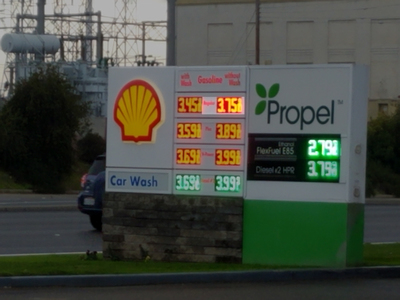 E85 selling for significantly less than E10 gives E85 a net gain in most instances despite lower MPG Shell station in Northern California, Dec. 2019 |
In addition, it is a fact that certain ethanol-gasoline blends from E20 to E50 will often provide equal or better miles per gallon than E0, even in gasoline-optimized engines. More than 100 years ago, public newspapers and technical publications cited story after story of the use of ethanol. For example, a newspaper story on Page 4 of the Manchester (UK) Guardian, May 23, 1913, reports on the use of a fuel blend containing 25% alcohol achieving ordinary performance results compared to non-ethanol gasoline. The same newspaper story states that a 50/50 blend (ethanol-benzol) was used successfully in Paris for motor-buses. The same story reports on "30 distinct and separate tests" in America on eight different engines. The tests compared gasoline, paraffin, and ethanol as stand-alone fuels. The results from the tests were that any modern engine could be run on ethanol without any material change to the construction of the engine.
On page 303 of the book "Denatured Or Industrial Alcohol" written by Rufus Frost Herrick in 1907, the author writes that tests on engines and fuels conducted at a 1902 International Competitive Exposition in Paris found that the best results were obtained using an 50/50 blend (alcohol with a "hydrocarbon" fuel - essentially an E50 fuel). https://books.google.com/books/about/Denatured_Or_Industrial_Alcohol.html?id=OTbkAAAAMAAJ&printsec=frontcover&source=kp_read_button#v=onepage&q&f=false
Other reports and studies that corroborate higher blend performance improvements are:
• NREL - Issues Associated with the Use of Higher Ethanol Blends 2002 http://www.nmma.org/lib/docs/nmma/gr/environmental/32206.pdf
• The Past, Present, and Future of Biofuels - intechopen.com 2011 http://cdn.intechopen.com/pdfs/20071/InTech-The_past_present_and_future_of_biofuels_biobutanol_as_promising_alternative.pdf
• Effects of High-Octane Ethanol Blends https://bioenergykdf.net/system/files/1/Thomas_Effects%20of%20High-Octane%20Ethanol%20Blends%20on%20Four%20Legacy%20Flex-Fuel%20Vehicles%20and%20a%20Turbocharged%20GDI%20Vehicle.pdf
• Study Finds Certain Ethanol Blends Can Provide Better Fuel Economy Than Gasoline http://www.greencarcongress.com/2007/12/study-finds-cer.html
• The Effect of Ethanol-Gasoline Blends - University of Nottingham... https://eprints.nottingham.ac.uk/29749/1/546471.pdf
• The Effect of Ethanol-Gasoline Blends http://www.stonis-world.com/docs/SuTCAF.pdf
• High performance Wayne State ethanol car wins 1998 Ethanol Vehicle Challenge https://wayne.edu/newsroom/release/1998/06/04/high-performance-wayne-state-ethanol-car-wins-1998-ethanol-vehicle-challenge-1464
• Ethanol Vehicle Challenge http://avtcseries.org/competitions/ethanol-vehicle-challenge/?section=innovations-highlights
• Freedom of choice: E20 ethanol blends take the value crown from gasoline, E10 http://www.biofuelsdigest.com/bdigest/2013/06/20/freedom-of-choice-e20-ethanol-blends-take-the-value-crown-from-gasoline-e10/3/
• Fuel Economy and Power Generation of 30% Ethanol (E30) Splash Blended Fuel in Fuel injected Non-FFV Gasoline Engines http://www.sdfu.org/assets/docs/uploads/gle-e30-challenge-white-paper-1-19-17final.pdf
• ACE Optimal Ethanol Blend Level Study http://www.speedperf6rmanc3.com/content/ACE_Optimal_Ethanol_Blend_Level_Study.pdf
• Ethanol Gasoline Blends and Small Engines - includes testing E20 http://factsheets.okstate.edu/documents/bae-1746-ethanol-gasoline-blends-and-small-engines/
All this not only goes to prove that the performance results your Monroney examples cite are flawed, but it's further proof that energy content is an irrelevant statistic when it comes to internal combustion engines.
EDMUNDS.COM...seriously, Edmunds?
What I find interesting is that you had go to a 10 year old road test conducted by Edmunds.com to support your ethanol lies and ignorance. Incidentally, if my company (The Auto Channel) can be dismissively referred to by you as a just "a car review website," then you should know that Edmunds.com is simply a copycat car review website (my company pioneered the automotive internet space and most of the functions and features used by websites of all kinds, such as streaming video). So if you want to diminish the significance of TheAutoChannel.com by intoning that we are a just car review website, then you are doing the same to Edmunds.com (and keep in mind that Edmunds' core business is not providing reviews and coverage of the automotive sector, it's just providing vehicle pricing).
In any event, yes, Edmunds.com did indeed conduct the 2009 test you mention, and I wrote and published a review of it shortly afterwards. One instance was in a reply to a reader. Here's what I wrote to Brian from Arizona:
"The Edmunds story you submitted is interesting but merely one of any number of anecdotal stories that could show one fuel better than the other. Right off the bat, environmental conditions, such as the wind they talked about, could have easily accounted for any difference. Assuming that the wind blew in precisely the same directions and exactly the same speed, not just close to the same speeds, you really have to adjust for the difference in the physical characteristics of the front and rear of the vehicle (front being obviously more aerodynamic and the back being more prone to act as a sail). I don't think that the physics of one is equal to the other.
"In addition, as the writer pointed out, there were different traveling speeds in the outbound and inbound drive. While you can say "X will make up for Y" in a general sense, you don't really know if X plus a wind speed of 10 MPH can be directly offset by Y plus the same wind speed. And this doesn't even account for how the vehicle burns gas at the different speeds. It's possible that if the vehicle's optimum MPG efficiency is attained at 60 MPH, 65 MPH could produce significantly different MPG results than 55 MPH, even though both speeds are 5 MPH different than the optimum. Over a protracted distance travelled even the slightest difference can add up to an alarming difference, but unless that distance is travelled on a regular basis by an individual then the difference could be irrelevant in their consideration of which fuel to use.
"In my estimation, a more correct test would be to have two identical vehicles, using different respective fuels, with equal payloads traveling alongside each other for the entire distance - whatever the distance might be. Also, either vehicle would have to avoid any "drafting" assistance that might occur if either vehicle followed too closely another vehicle. On the other hand, a pure engine bench test with equally optimized engines - one optimized for 100% alcohol and one optimized for 100% unleaded gasoline - is probably the only way to do it. In my understanding, any bench tests conducted of optimized engines have shown that the MPG efficiency is equal.
"I think the important point to learn from the Edmunds' test is that the results were quite similar, and that the writer did not report that the vehicle suffered any damage to its engine due to using alcohol. As you may know, one of the pernicious "manufactured" complaints made against the use of alcohol in a "gasoline" engine is that alcohol will damage it.
"Alcohol (ethanol) doesn't have to give better performance than gasoline for it to be a better fuel for the American public; it merely has to be similar. The added benefits of alcohol (cost, lower harmful emissions, domestic availability, less engine wear, less need for oil changes, etc.) put alcohol far ahead of gasoline. And under a given set of circumstances, such as interruption to the access to oil – whether by disaster, war or terrorism – cost isn’t even an issue."
One of the peculiar aspects of many anti-ethanol commentaries like yours, Marlo, is that you and the others act as if you've never owned or driven a car. I can't imagine that you, yourself, would not have experienced variations in MPG performance from the slightest differences in wind, weather, and traffic conditions. A little thing like under-inflated tires could reduce MPG by as much as 2% or 3%. Jack rabbit starts, un-even acceleration, and driving with the windows open can all negatively impact MPG. Why would you not know this and automatically take these things into account? More importantly, why would you rely on an 11-year old story from Edmunds.com to try and prove a point. The simple fact they have nothing more recent and authoritative for you to latch onto means that they (and you) are out of touch with the issue of fuels.
On this same point, you're critical of my comments about E0 (gasoline with no ethanol). You say that my citing prices and information about E0 is "a red herring;" that it's irrelevant since the vast majority of our engine fuels are ethanol-gasoline blends. The point you miss is that there is a vast number of people who want ethanol-free gasoline; who search for places to buy E0; who believe that anything other than E0 is corrosive and evil. I deal with these people every single day. I compare E0 prices to E10, E15, and E85 because the price differences are one of the significant factors against E0. You don't know this because you don't know anything about this subject. You think Jerry Taylor and Edmunds are the state-of-the-art in ethanol information.
Turning to the energy security issues, you compound your previous idiotic comments with more idiotic comments. And yes, I was critical of those idiotic comments.
You now write:
-
"My disparaging comment about oil import alarmism is accurate. The so-called oil weapon was never the lethal threat OPEC propaganda made it out to be. Petro states need to sell their oil to someone or they go broke,
and petroleum is a global market with multiple buyers and sellers. Even if OPEC decided to stop selling us oil, we could still purchase crude from other sellers."
Marlo, the reality is that if the so-called oil weapon was not the lethal threat that some people made it out to be, it's because the world was not and is not running out of oil, and because sellers do need to keep selling to stay alive. However, the "embargo" did have a drastic effect on America (along with other parts of the world), temporarily and permanently. We were subject to rationing akin to wartime or depression conditions - without the war or depression. Some businesses went bankrupt because of the rationing and high fuel price increases. The embargo directly changed which vehicles the public buys, and indirectly affected how the public makes other purchasing decisions.
Furthermore, I think that the alarmism of the oil embargo is at least partially responsible for the near paralyzing climate-change alarmism that we now suffer from. I know that some gasoline whores argue that the 3, 4, 5, 6, 7, fold and more increase from the days of 20 and 30 cent gasoline is not a big deal compared to the cost of other items in a modern world, but there was no reason for the prices to rise except for greed. The cost of lifting the oil out of the ground didn't materially change; what changed is that the oil rats needed more money to feed their fat faces, pay for global terrorism, and support a gluttonous lifestyle of high-price prostitutes, drugs, and million dollar cars.
All of this could have been avoided...can be avoided...with domestically produced ethanol as our primary engine fuel. The added benefits are fewer international wars, much less pollution, less illnesses, and a healthier domestic economy. Your ignorance of these issues is, as I said in September, because you don't have any detectable experience in real business.
In your reply to me on Wednesday you also wrote:
-
"Fracking continues to produce energy security dividends. On September 14, 2019, 25 drones and cruise missiles bombed two major Saudi oil installations, knocking out 50 percent of Saudi and 5 percent of global oil
production. Oil prices jumped 20 percent—but for less than a single day. By September 30th, prices returned to pre-attack levels. The impact on the U.S. economy was minuscule and fleeting."
You're echoing the insanity of Jerry Taylor's comments from a decade ago. You make it sound as if this was good news. The only reason that Saudi oil installations exist at all is because of the expenditure of billions of U.S. dollars to defend those facilities - facilities that would probably be in the hands of a living Saddam Hussein and Iraq if we didn't spend billions/trillions to go to war with him, twice. On top of the dollars, thousands of American soldiers and sailors were killed, and tens of thousands more were injured (many with permanent disabilities). This is not good; it may be better than having hundreds of thousands of deaths and millions with permanent disabilities, but either way it not good. Good is that no American serviceman or woman has ever died defending ethanol fuel production and distribution facilities.
Then you wrote:
-
Since the 1973 Arab-Israeli War, the main oil-related energy security threat has been price shocks.
What? The Gulf War, and its sibling Gulf War II, occurred two and three decades after the 1973 Arab-Israeli War, and we're still policing Iraq, and still occasionally losing military and civilian personnel.
Fracking is profitable only if crude oil prices stay above $50 per barrel. This means that oil companies involved in fracking have an incentive to keep crude oil prices high, and one of the ways to keep crude oil prices high is to insure there is turmoil and unrest in the world. This is not a good thing. This is not a healthy thing.
A change to using much higher levels of ethanol would bust the oil market. It would bankrupt our enemies and despotic regimes, that would be a good thing.
Marlo, you write that if high levels of ethanol were used that it would cause serious financial harm to our convenience industry. Is your knowledge of the real business world so limited that you don't realize that the same service station/convenience industry would be needed to distribute ethanol? Why would providing ethanol filling station facilities be different than gasoline filling station facilities? They would both sell coffee and donuts and cigarettes and beer.
You know what would bankrupt the service station industry? The dominance of electric vehicles. Ethanol is actually the savior of the service station/convenience industry because it keeps the use of internal combustion engines alive. Internal combustion engines are incredible machines; there's nothing wrong with them. Their only downside is that people like you want to keep feeding them dirty petroleum oil fuels. Petroleum oil fuels will never be clean enough to keep internal combustion engines alive. Ethanol will keep them alive, and keep all industries related to servicing and maintaining them alive. Spark plug manufacturers will stay alive, fan belt makers will stay alive, all the businesses that you say would be hurt by increased ethanol use will all be able to stay alive because of ethanol. Even the oil industry itself can stay alive to supply some of the items used by internal combustion engines and maybe a small level of fuel to act as a cold start ingredient.
You list costs for service station improvements to handle the ethanol fuel. In many instances, no upgrades are needed. Many claims that equipment changes would be necessary are empty warnings. Ethanol is compatible with more rubbers, plastics, and metals than gasoline and aromatics. More importantly, service stations undergo improvements and repairs on a regular basis. Instead of digging up worn-out underground equipment and replacing it with more gasoline-related equipment, they'll replace it with ethanol-related equipment. In fact, because ethanol is so much safer than gasoline, the ethanol changeover will save money because they may not require as many precautionary measures (you can actually safely store ethanol in above ground tanks). One of the reasons that new equipment is so expensive to install is because of the dangerous nature of gasoline. And if there's a huge need for money to make the change over, then we'll be able to afford it because of the trillions of dollars we'll be saving by not having to defend the oil world. And we can put American service personnel to work 'saving the internal combustion engine and related industries' rather than saving the degenerate lifestyles of oil princes and dictators.
Clearly, Marlo, you have not thought this out.
In my earlier rebuttal of your anti-ethanol lunacy, I wrote that we wouldn't need an E85 mandate to fulfill Frank Luntz' energy independence comments because a national move to E30 or E40 would accomplish that feat, and all gasoline-powered passenger cars on the road can safely and efficiently use E30 and E40 with no modifications. I also said that modern cars can all be made E85 compatible with a simple adjustment to the onboard computer system. You misunderstood what I wrote, and you have jumped to the conclusion that I was referring to engine conversion kits; kits that can cost a few hundred dollars to buy and install. But that's not what I was talking about. I was talking about the virtually free ability to adjust the computer software that's already installed. If you had any real knowledge of the entire issue you would have understood this.
But the piece de' resistance of your low level thinking is that you would venture into the moronic food vs. fuel issue, coupled with your unmitigated gall of pretending that you care about "wildlife habitat." Next to volcanoes and large meteors crashing into the Earth, the oil industry is the largest destroyer of our planet's wildlife habitats. This is what oil does:
This is what corn fields do:
Let me show you again, because sometimes people need to see things a couple of times to get it.
Oil field:
Corn field:
America has sufficient land to grow all the corn needed to cover our fuel requirements. But what you did with corn is what you did with the issue of engine conversion kits: You limited the options to your own low level of understanding of the issue. Corn is just one type of crop that our fantastic farmers can grow for ethanol. Ethanol yields from corn is actually on the low side compared to many other crops, and some of the other crops are capable of yielding 2, 3, 4, and 5 times more ethanol per acre per year than corn. Some of these crops require far less water and fertilizer. Some require no water and fertilizer at all. And some raw materials, such as seaweed and algae can yield up to 100 times more ethanol than corn per acre per year without needing any water or fertilizer.
America doesn't presently rely on most of these other crops because we don't have the need. And we don't have the need because there are far too many ignorant people running around spreading false information about ethanol.
The Tie Between Big Oil and Environmental Groups
Marlo, you challenged me to name "environmental" organizations that have financial relationships to the oil industry. Typical of how you see things, you have just a very myopic view of how a "funding" relationship can exist between an environmental organizations and the petroleum oil industry. For instance, 12 years ago, I wrote an expose about California Propositions 7 and 10. These were funding proposals designed to help develop wind power, solar power, and biofuels. The propositions were rejected by the voters. Leading the charge against the propositions were the Teachers' Unions. I thought it odd, since these are the same teachers who are so instrumental in programming their students on environmental issues. I did some investigation. What I learned was that the Teachers Union pension funds were heavily invested in oil securities. So while they coached their students to hate the oil industry, they desperately didn't want to see their investments go down the drain. Therefore, they worked to defeat legislation that could negatively impact their investments. With this in mind, you should find the following NBC news report revealing:
• Then you should consider this group that helps old industry companies invest in environmental organizations and greenwashing efforts: http://www.ipieca.org/
• Here's another story that draws the connections between some conservation groups and the oil industry: https://www.theguardian.com/commentisfree/2019/jun/26/shell-not-green-saviour-death-machine-greenwash-oil-gas
• From The Guardian: https://www.theguardian.com/sustainable-business/2016/aug/20/greenwashing-environmentalism-lies-companies
• About "greenwashing": https://blog.ucsusa.org/kathy-mulvey/fossil-fuel-giants-are-pumping-out-greenwashing-their-tricks-wont-work
• More about Exxon "greenwashing": https://www.greenbiz.com/article/exxon-olympics-and-greenwashing-20
• BP "greenwashing" https://www.climateliabilitynews.org/2019/12/04/bp-greenwashing-clientearth/
• More Exxon "greenwashing": https://www.vice.com/en_us/article/qvgm5d/exxon-mobile-is-getting-sued-for-billions-for-saying-fossil-fuels-are-good-for-the-planet
• Another story: https://www.marketplace.org/2014/09/23/oil-companies-and-environmental-non-profits-team/
• Another: https://theintercept.com/2019/09/06/exxon-mobil-progressive-policy-institute-climate/
• Another: https://www.rffund.org/programs/environment
• Another: https://energyfactor.exxonmobil.com/
More directly, in your December 18th editorial/rebuttal to me you asked if I'm prepared to state on the record that oil industry PR firms created environmentally-sounding organizations as a front for the oil industry. Absolutely I am, and a good example is the Global Climate Coalition: https://www.climateliabilitynews.org/2019/04/25/gcc-global-climate-coalition-history/
Marlo, you posted some names of entities that you call "prominent environmentalist critics of corn ethanol" and ask if I feel they are shills for the oil industry. One group you named is the Environmental
Working Group. Yes, I think they're acting like a shill for Big Oil, whether they receive funding from oil companies or not. Specifically, I found that Emily Cassidy's report "EPA Watchdog Probes Climate
Pollution from Dirty Corn Ethanol" (published on the EWG website on October 16, 2015) was a sham and tantamount to an API press release. I told Ms. Cassidy and EWG this in my correspondence with them at the time.
An 'encompassing highlight' of my response was:
-
"Emily, thanks for your reply and the information, but it looks like you've taken the information out of context and perhaps invented some new details to suit your unwarranted attack on ethanol."
The information I was referring to was her citing a couple of paragraphs from one single page in a
one thousand page EPA Regulatory Impact Assessment report.
Marlo, I'd be happy to send you the full text of my comments to Ms. Cassidy, if you'd like.
In my rebuttal to your September editorial, I criticized you for relying on the anti-ethanol opinions of organizations that you've spent two decades arguing against. In your reply to my rebuttal, you write:
-
"So, according to Rauch, to be consistent, I must either accept or reject everything environmentalists say. That is silly. Like most people, environmentalists may be wrong about some things (e.g., climate models are
accurate—false!) but right about others (e.g., Renewable Fuel Standard-induced corn crop expansion promotes aquatic dead zones and
habitat loss—true!)."
This is another good illustration of how wrong you are and how little of this subject matter you know. You provide an example and hyper-link of how you think environmentalists can be wrong, and then an example and hyper-link of how you think the same environmentalists can be right - the example and hyper-link you give of them being right is that RFS-induced corn crop expansion promotes aquatic dead zones.
(Incidentally, Marlo, the hyper-link you embeded on the CEI webpage for the aquatic dead zone and habitat loss reference is broken. However, I presume you are quoting from the EPA's Biofuels and the Environment Second Triennial Report to Congress dated June 29, 2018. I happen to have a copy of it.)
The problem for you is that you took a summary sentence from the report out of context and embellished it. The actual quote from the report is "Demand for biofuel feedstocks may contribute to harmful algal blooms..." (emphasis of the word "may" is mine)
In any event, the RFS is not responsible for this, and to prove the point, I'll use the hypoxia in the Gulf of Mexico since this is the primary aquatic dead zone in U.S. territory. This dead zone was first documented in 1972. As you may recall, the oil-gasoline crisis didn't happen until a year later, in 1973. The significance of these dates is that 1973 would be the start of modern critical discussions about the need for alternative fuels, and ethanol as one alt-fuel solution. The RFS program wasn't enacted until more than 30 years later, so certainly you can't seriously blame Gulf of Mexico hypoxia in 1972 on excess ethanol corn farming and fertilization.
Moreover, although the Gulf of Mexico hypoxia was documented in 1972, the condition was known to have existed in the Gulf of Mexico as early as 1950, again without "excess corn farming and fertilization." There was no dramatic growth in corn farming for ethanol until the early 2000's, so at the very least, there was half a century of hypoxia in the Gulf of Mexico without the "excess corn farming and fertilization" that ethanol-haters like you refer to. Blaming dead zones in the Gulf of Mexico on increased corn ethanol production and use is patently absurd.
There's two other things to consider on the point of Gulf of Mexico hypoxia. First, corn fields aren't the only locations in the Midwest where fertilizer is used. Fertilizer is used on all crops; as well as on the lawns and flower beds of residential communities, educational and corporate campuses; and on golf courses. Did you know that in the 10 states that border the Mississippi River, and the states whose minor rivers and streams feed into the Mississippi, that there are thousands of golf courses - the number may be as large as 10,000 golf courses. They all use fertilizer. This fertilizer contributes to the pollution that runs into the Gulf of Mexico, and yet, probably not one of those golf courses grows crops intended for ethanol production.
Secondly, hypoxia occurs in many places around the world. I recognize that the Mississippi River is a powerful river, but even the Mississippi River is not powerful enough to create hypoxia conditions in China, New Zealand, Spain, Italy, Oregon, and the Baltic Sea. In all, there are more than 400 dead zones around the world. Corn and ethanol production did not create these dead zones.
The significance of my telling you all this about hypoxia, in addition to setting the record straight, is that it shows you have trouble knowing what's true and what's false. A little personal research on your part would have revealed the above information to you. But if you're gonna listen to what API and ExxonMobil tell you, you'll never learn the truth. In your December 18th rebuttal to me you wrote that my specific claims about the ostensible advantages of ethanol-based fuels should be factually examined, as if that was what you were going to do. As I've shown above, you've not fully examined anything, and you certainly have not proven my facts (not claims) wrong.
Regarding habitat loss in the U.S. because of corn crops, land use today is approximately the same as it had been at the start of the Renewable Fuel Standard, yet far, far more corn is being grown today than ever before. Fertilizer use and water use is also lower today than prior to the RFS.
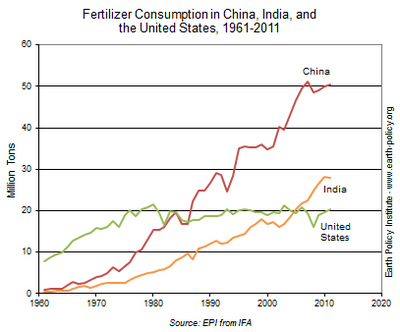 |
WORDS
I'll conclude for now with how you began your editorial-rebuttal to me on December 18th, with a response to your accusation that I made an ad hominem attack against you and that it was littered with juvenile words. I thought this was funny considering your anti-ethanol ad hominem attack on Frank Luntz.
Yes, I say your ad hominem attack on Frank Luntz. There was nothing I could find, then or now, to indicate that you know Frank Luntz. There is nothing I could find, then or now, to indicate that you have any knowledge and experience in either the subject of engine fuels or political polling...I think I made this pretty clear in my September open letter to you - which, by the way, I immediately sent to you via email (you, on the other hand, didn't even have the courage to directly send me your reply, although you have my email address).
And yet, despite not having any familiarity with either the subject matter or the man (Frank Luntz), you felt empowered to write and publish a critique of his FOX NEWS on-air comments, using information that was incorrect, out-of-date, or exaggerated. I presume it's because you are associated with a "think tank," or as I term it, a "stink tank." I don't believe you did any thinking, you just did stinking.
The difference between you and me is that I have knowledge of the subject matter. But, for example, four years ago when I replied to Emily Cassidy about her imbecilic anti-ethanol editorial for the Environmental Working Group website (as discussed above), I didn't seek to impress her with true or false information, I inquired as to the source of her information. It was only after learning that she cherry picked a couple of factoids, and then took them out of context, to write a fairly lengthy piece that I replied to her with actual, factual, in-context information.
I think you should have tried contacting Luntz before attacking his position, or ask someone at CEI who has some knowledge of the subject matter to step in for you (of course, I don't believe there is anyone at CEI with any knowledge of the issue). And then, after hearing what he had to say, publish a response.
Regarding your dislike of my chosen words: I think it's your cry-baby response to my use of words that is juvenile, and without any understanding. In my view, Marlo, words are remarkable tools. They allow you to describe something in a short, easy manner. For example, if we didn't have the word "chair" we would have to use several other words in a sentence to describe the function of what a chair is. It's the same as referring to someone as a "moron," which is a scientific term to describe a person with a certain limited mental capabilities. I wrote very extensive comments in my September reply to you. If all I did was to write "you're wrong, you're an idiot," then maybe you would have the right to call my words juvenile. If I call someone an "idiot" I'm only employing the word in its medical/scientific description. And on those occasions when I've called someone an idiot, and they complain that I'm being too harsh, I'm always willing to upgrade them to status as a moron or imbecile. Are you applying for such re-classification?
I hope I have sufficiently responded to your editorial/rebuttal of two days ago. I think I left out one or two things, but owing to the busy-ness of the season, I have some other things to do and I wanted to get a reply to you while the embers of our mutual ire are still glowing. I look forward to any response you may have...I hope you will have a response. And of course, if you would ever like to take this exchange outside...actually I mean inside to a public auditorium with an audience to formally debate the issues and broadcast it live over the Internet, I'll be your huckleberry.
Cheers.
Marc
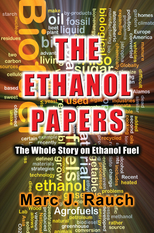 |
For a complete understanding of ethanol fuel, I suggest a perusal of my 641-page book THE ETHANOL PAPERS. It's available to read online for free by CLICKING HERE.
THE ETHANOL PAPERS is now also available in print via Barnes and Noble by just CLICKING HERE.



